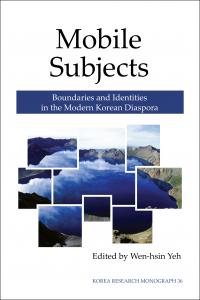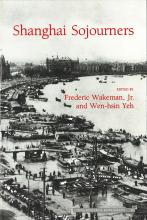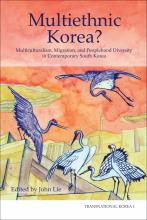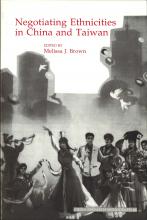Mobile Subjects
Mobile Subjects
Wen-hsin Yeh, ed.
The essays in this collection offer a rich and complex picture of changing circumstances on the Korean peninsula over the past one-and-a-half centuries. By drawing attention to mobility in subjectivity—to the contested nature of subjectivity in the processes of mobility—this volume seeks to connect the experiences of the Korean diaspora with those of the homeland, thereby enriching an understanding of Korean nationalism from its flip side.
As a nonprofit academic press, we need your support to publish our books. Your gift can help us make more of our titles available as e-books. DONATE NOW
Title information
Mobile Subjects draws attention to modern Korean experiences with mobility, experiences that played an important role in forming Korean constructions of an ethnonationalistic discourse of territoriality. By drawing attention to mobility in subjectivity—to the contested nature of subjectivity in the processes of mobility—this volume seeks to connect the experiences of the Korean diaspora with those of the homeland, thereby enriching an understanding of Korean nationalism from its flip side. The essays in this collection, by focusing on mobility, offer a rich and complex picture of changing circumstances on the Korean peninsula over the course of the past one-and-a-half centuries. They underscore the point that there have been intimate connections between national constructions and spatial mobility. They also demonstrate the intellectual fruitfulness of an approach to the peninsula that brings in the continental as well as maritime dimensions of the Korean diaspora.
Contributors:
Jane Cho (Ph.D., University of California, Berkeley) is a visiting lecturer in history at the University of California, Berkeley. Her current research interests focus on how immigration affects practices surrounding funerals, weddings, and childbearing within the Korean diasporic community.
W. Taejin Hwang (Ph.D., University of California, Berkeley) is a lecturer at the Underwood International College of Yonsei University in South Korea. Her research focuses on Cold War transpacific migrations of institutions and peoples, and she is currently examining American postwar developmentalism in Asia.
Kwangmin Kim (Ph.D., University of California, Berkeley) is assistant professor of history at the University of Colorado, Boulder, and postdoctoral associate at the Council on East Asian Studies at Yale University. His research focuses on the role of the two global currents of the early modern world—colonialism and transnational trade—in transforming East Asia.
Miriam Kingsberg (Ph.D., University of California, Berkeley) is assistant professor of history at the University of Colorado, Boulder. Her book, Moral Nation: Modern Japan and Narcotics in Global History (forthcoming, UC Press), examines illegal drugs as the foundation of a global consensus on the nature of political legitimacy in nations and empires. She is currently researching the history of anthropology, archaeology, and national identity in twentieth-century Japan.
Sungyun Lim (Ph.D., University of California, Berkeley) is assistant professor of history at the University of Colorado, Boulder. Her research interests include the histories of modern Korea, the Japanese empire, women, and law. Her dissertation, “Enemies of the Lineage: Widows and Customary Rights in Colonial Korea, 1910–1945,” examines the transformation of Korean family customs under Japanese colonial rule.
Yishi Liu (Ph.D., University of California, Berkeley) is a lecturer at the School of Architecture in Tsinghua University in China. He is researching modern Chinese architectural history and has published articles in Architectural Journal (Jian zhu xue bao) and Traditional Dwellings and Settlements Review.
Ivo Plsek is a Ph.D. candidate in the department of Political Science at the University of California, Berkeley, and is currently a fellow of the Japan Society for the Promotion of Science at Waseda University. His dissertation project investigates the role of political elites in the reconciliation politics of Japan and Germany after 1945.
Wen-hsin Yeh is Walter and Elise Haas Chair Professor in Asian Studies and the Richard H. and Laurie C. Morrison Chair in History at the University of California, Berkeley. An authority on twentieth-century Chinese history, Yeh is author or editor of fifteen books and numerous articles examining aspects of Republican history, Chinese modernity, and the origins of communism and related subjects.
Wen-hsin Yeh, ed.
Wen-hsin Yeh is professor of history at the University of California, Berkeley. She has served as the director of the Institute of East Asian Studies and the chair of the Center for Chinese Studies at Berkeley. She has edited and contributed to many IEAS publications, including Mobile Subjects; Mobile Horizons; History in Images; Cities in Motion; Empire, Nation, and Beyond; Cross-Cultural Readings of Chineseness; Landscape, Culture, and Space in Chinese Society; and Shanghai Sojourners.
B.A., History, National Taiwan University; M.A., History, University of Southern California; Ph.D., History, University of California, Berkeley
Mobile Subjects (KRM 36)
Acknowledgments – 1
Wen-hsin Yeh
Introduction – 3
Wen-hsin Yeh
- 1. Korean Migration in Nineteenth-Century Manchuria: A Global Theme in Modern Asian History – 17
Kwangmin Kim - 2. Status and Smoke: Koreans in Japan’s Opium Empire – 38
Miriam Kingsberg - 3. Women on the Loose: Household System and Family Anxiety in Colonial Korea – 61
Sungyun Lim - 4. An Indispensable Edge: American Military Camptowns in Postwar Korea – 88
W. Taejin Hwang - 5. U.S.-Educated Elites and the Phenomenon of Study Abroad – 123
Jane Cho - 6. Homes on the Border: Ethnicity, Identity, and Everyday Space in Yanbian – 148
Yishi Liu - 7. Exit, Voice, and Refugees: A Case Study to Understanding Political Stability and Emigration in North – 183
Ivo Plsek
Contributors – 217
Index – 221
|
JOURNAL REVIEWS |
|
"While many scholars have examined the strategic uses of territoriality, the essays in this volume foreground the processes of cultural interaction, dislocation and dispossession as critically important to understanding the actual experiences of Koreans and to shaping understandings of the modern nation. The text sets itself apart from other collections on the Korean diaspora by refusing to define diaspora against nation as a solid reference point, but rather demonstrates how Korean modernity itself has been shaped by experiences of transnational movement and foreign encounter.... Given the quality of original research presented in this volume, it is clear that the authors will have a lasting impact in the field of Korean Studies." ~Rachael M. Joo, Middlebury College, in Pacific Affairs 89, no. 1 (March 2016): 182–184 (http://www.pacificaffairs.ubc.ca/book-reviews/book-reviews-2/recent-book-reviews/book-reviews-vol-89-no-1/#mobilejoo)
|
|
“What is fascinating about this book on diaspora is that it includes chapters on Koreans in the homeland….One might suspect “ diaspora” in this book’ s subtitle, then, is a misnomer. To that point, Yeh argues that “ [c]entral to Korea’ s colonial experience was the dispossession of the Koreans— culturally, socially, economically, and politically— in their homeland” (p. 6) and that this experience of colonial or neocolonial displacement was what rendered Koreans in the homeland still diasporic. These chapters on Koreans in the homeland seem somewhat misplaced at times, but Yeh’ s attempt to reconceptualize the notion of diaspora is certainly thought-provoking.” ~Young-A Park, University of Hawaii at Manoa, in Journal of Asian Studies 74, issue 3 (August 2015): 770-771 (http://journals.cambridge.org/abstract_S0021911815000923) |




